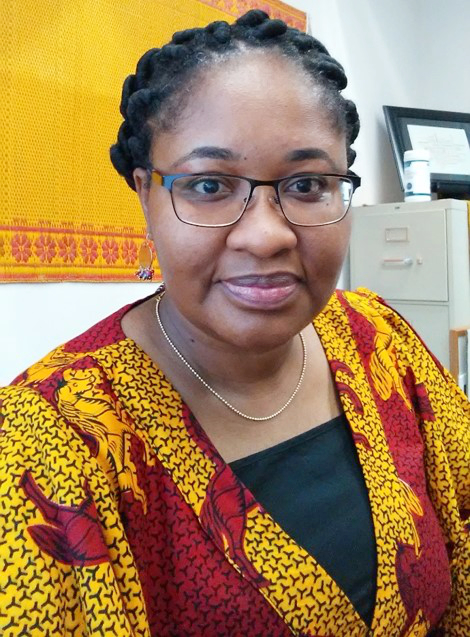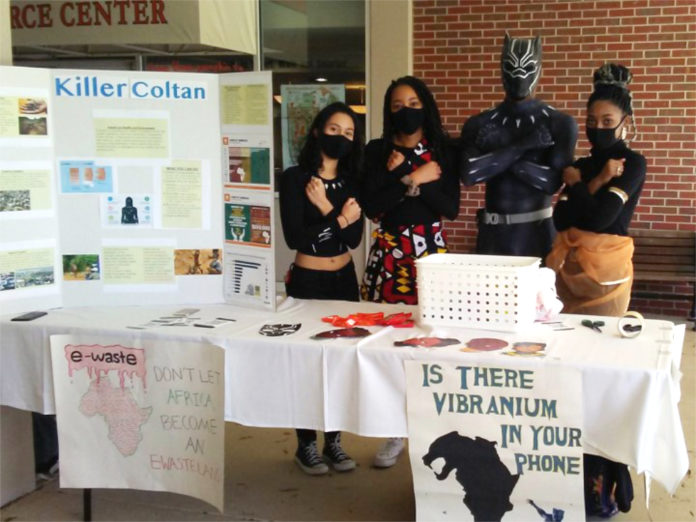MACON – Dr. Chinekwu Obidoa, associate professor of global health and Africana studies, and students in her INT 301 course, titled Globalization: Africa’s Experiences, will present an exhibit Nov. 30 in the Connell Student Center breezeway to raise awareness regarding coltan mining in the Democratic Republic of the Congo (DRC).
Coltan is an important mineral that is one of the most essential ingredients involved in creating and powering different technological gadgets. As one of the densest precious metals in the world, it is considered indispensable to technology, though scientists are actively looking for a replacement for it.
Some 80% of the world’s reserves of coltan are located in the DRC. Much of the coltan is mined illegally because the global supply chain is heavily dependent on how cheap the material is.

“In the DRC young people often, without shoes on or even appropriate equipment, mine coltan. Then it is transferred to multiple groups of middlemen before it eventually reaches its destination, somewhere in Asia where most digital gadgets are manufactured,” Dr. Obidoa said.
“Here in the West, we are mostly oblivious about the complex and exploitative nature of this supply chain. The technological advances of the globalized and increasingly digital world have not occurred in a vacuum. The illegal exploitation of coltan in the DRC has played a critical role in creating a fast-paced digital global environment.”
Another negative aspect of Africa’s experience with modern technological globalization has to do with the dumping of e-waste which includes discarded, digital and electronic devices. People often upgrade their phones, but do not dispose of their old devices properly, mostly because sustainable recycling models and approaches are not readily available to them.
Subsequently, Africa has become one of the dumping sites for the world’s e-waste. This is an issue that Dr. Obidoa’s class plans to bring attention to, as well.
During the Nov. 30 event, students will have various poster boards, handouts and flyers that they will utilize to educate other members of the Mercer community on the coltan crisis.
“If all goes well, the event will leave those who attend with much to think about concerning their use and disposal of e-waste. Ideally, people will research more about what materials are in the products they buy, as well as where those materials come from before they buy them,” said Samuel Barrow, a student in the INT 301 course.
The class hopes to be able to both educate students on what is happening in Africa and also enlighten them as to how they are a part of the problem, specifically concerning e-waste.
The event will be “Black Panther” themed so that students can better relate to the material being presented. The goal is for students to associate coltan to the vibranium depicted in the film so that they can understand just how important and precious it is.
Dr. Obidoa said it is very important to the class for students to not only stop by and ask questions, but also to take the information they learn very seriously by thinking about how the rest of the world is affected by these actions.
“My hope is that the event will raise awareness and foster curiosity about these issues. We want students to be both inspired and challenged. By raising this consciousness, we hope to stimulate action, especially in the area of e-waste recycling,” Dr. Obidoa said.
As part of their class projects, students will also have an e-waste drive where they will collect as many old devices as they can get and donate them to Staples, which has a proven method of recycling technology.
Additionally, to fulfill the action requirement of this INT 301 class, students were required to work in groups to create virtual educational platforms for educating the public on these issues. Each group designed a website and created an Instagram page that they have managed for several weeks, in addition to collecting e-waste for donation to Staples.
“I think coltan is an extremely important issue that is not given nearly enough attention,” said Barrow. “The conditions and treatment of the coltan miners in the DRC are unacceptable, and I think if this was occurring in the United States the entire world would already know about it. However, because it is in Africa and does not directly affect us, there has been little light shed on the issue. Our goal is to inform more people of what is happening to help stop companies from buying coltan from the DRC.”
Featured photo courtesy Chinekwu Obidoa










